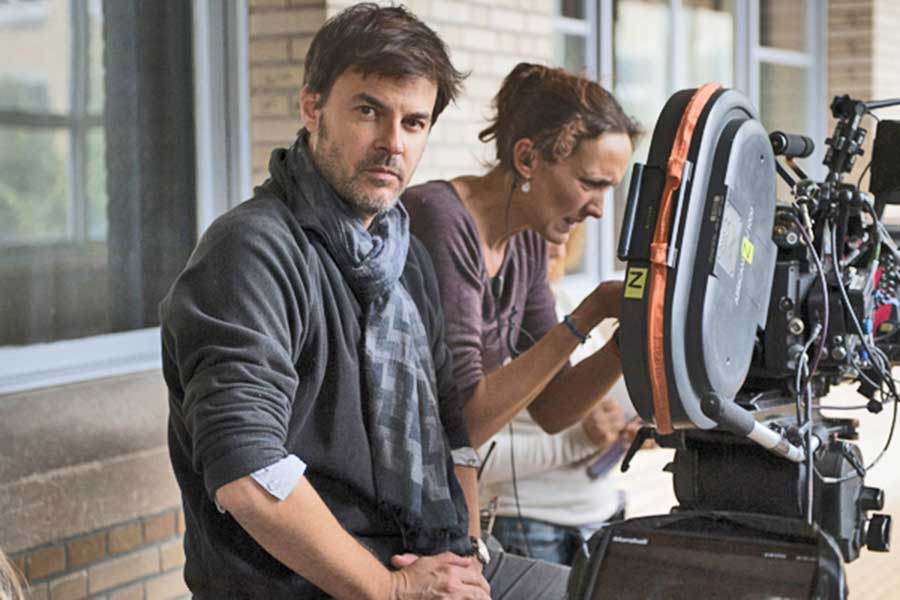“Frantz,” by gay French filmmaker François Ozon, is a black-and-white costume drama set in 1919 Germany. A loose remake of the Ernst Lubitsch drama “Broken Lullaby,” this handsome romantic melodrama, opening March 31 at Ritz Theatres, has Anna (Paula Beer) mourning her fiancé Frantz (Anton von Lucke), who was killed in the war. One day, she spies Adrien (Pierre Niney) at Frantz’s grave and befriends him. When Adrien visits Frantz’s parents, Hans (Ernst Stötzner) and Magda (Marie Gruber), he recounts stories about their friendship. However, Adrien eventually reveals his relationship with the dead man to Anna, and the dynamic between them changes.
On the phone from New York, Ozon chatted with PGN about making “Frantz.”
PGN: What can you say about the challenges of making a period piece, shooting in Germany and filming in black and white?
FO: It was interesting. The black and white helped me a lot. It’s difficult to imagine period films in color. There are many documents and archives that are in black and white. It was more realistic, and involves the audience more.
PGN: I like that the grayness reflects the characters’ moods. There are a few scenes in color, which are striking when they appear.
FO: Yes, the period of mourning and death … black and white matched well with that. And I wanted emotional moments when the color comes back. These scenes were not always memories, but a fantasy or moments of happiness.
PGN: “Frantz” connects to your previous film “Under the Sand,” in that it is a kind of “ghost story,” in which the dead man haunts the living. Can you discuss this theme in your work?
FO: Yes, I think it is always interesting in films to speak about the dead and tell a story around a dead person. There is an idolization. You can imagine what you want about [Frantz]. Adrien and Anna and Frantz’s parents all have their own vision of him, and each has a different point of view. They can project what they want on his character.
PGN: “Frantz” connects to other films you’ve made such as “The New Girlfriend” and “Young and Beautiful,” in that it portrays a young woman finding herself and her self-worth. Can you discuss the appeal of this theme in your work?
FO: I love to identify myself to young girls. I don’t know why; I am an old man now! I think there is emotion on Anna’s journey. First she’s a victim of a difficult period, and at the end she understands who Adrien and Frantz were. I like her evolution.
PGN: Can you talk about casting Paula Beer as Anna?
FO: I didn’t know Paula. I met her at a casting session in Germany. I fell in love with her face and her maturity; she was only 20 years old. She was very emotional and clever, and had a beautiful face. She reminded me of Gene Tierney. I made a test with her and Pierre in Paris and the chemistry between them was perfect. They helped each other. He didn’t speak much German and she didn’t speak much French.
PGN: Speaking of German and French, art, poetry and music seem to unite the characters across cultures. Can you discuss that?
FO: Yes, it’s a theme of the film. Art can unite countries and people and that’s why it was important for me to use the French and German [references] to show that the characters love music and painting and are curious about the culture of another country. Anna knows Verlaine, and Adrien knows German literature. It [shows] how people understand and accept one another.
PGN: “Frantz” features characters keeping secrets and telling lies to protect others. How do you want viewers to judge your characters’ behavior?
FO: I think it was interesting that this post-WWI period was one of transparency. Sometimes secrets and lies are helpful in a situation to support life. The lies that Adrien and Anna both tell are not the same. Sin is an important theme in the film. [In] the scene where the priest and Anna talk, she asks what should she do. The priest responds to protect people. After all this period of [war and] death, it’s very touching. The audiences can understand it.
PGN: The characters are all coping with tragedy and loss. What is your coping mechanism for dealing with a loss?
FO: I make movies! [Laughs] The best way to work, I think, is to make films. Films are therapy for me, a little bit. When you make a film with complex feelings, it’s a way to understand people, and it’s always complex how people react in front of death and pain and so many ways of mourning.
